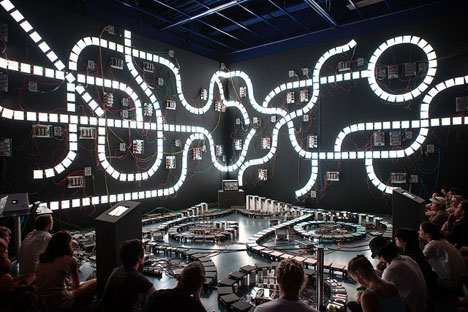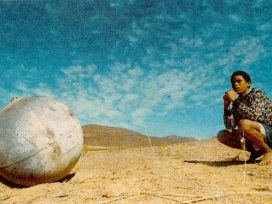Without a proper understanding of the way the global (data) economy actually works, we can’t effectively reinvent our culture. So says Geert Lovink in conversation with István Józsa. Lovink’s solution: while building independent infrastructures remains of primary importance, net criticism needs updating and upgrading, before it becomes subject to deletion.
István Józsa: Poems, stories, and novels have been written since ancient times; Boccaccio’s Decameron is over six hundred years old. There are narrative traditions that stretch over millennia. Today, well established genres are being deconstructed using worldwide communication “tools” such as blogs, chat, Skype and Facebook, with their likes and comments. These tools are replacing the telephone, the letter, the use of maps, the sharing of feelings, places suited to meeting in person, discussions, shopping in malls or markets.
I do not want to deny the possible advantages inherent to Facebook, as it is obvious to me that in some cases it is a useful communication platform. Facebook works for free and offers many opportunities. It is convenient if you want to create groups, read the latest news and follow ongoing events. It offers the chance to find people and get in touch with friends and acquaintances whom we haven’t seen for a while. These facilities may also take a negative turn when used to insult someone publicly with comments that would otherwise be “nobody’s business”. Most of the thoughts shared on Facebook are informal texts. But my question is: are new genres being born at the beginning of the third millennium, genres that never existed before?
Geert Lovink: The Internet as a mass phenomenon is relatively new. Historically speaking, it is only recently that large sectors of the population still had to figure out what the Internet was all about. This means we’re finally moving on from basic questions of the Internet’s materiality and ontology to a wider debate about its larger purpose. It is no longer enough to measure and discuss its impact. There is, at present, a rapidly closing window of opportunity to have a broad consultation about which Internet you want, and then build it. If you do not want to depend on monopoly services from elsewhere, and yet complain about a dependency on “foreign” cultures, it is time to act. You can’t have it both ways. This also applies to Central and Eastern Europe. You are an actor and no longer a victim. Either you get involved with building independent infrastructures or accept that you will be Facebook and Google subjects for decades to come, condemned to do little more than spread resentment about the loss of your “culture”. Media architectures have consequences. And once they are installed, they tend to withdraw into the background and become part of your invisible every day life routines. Once so embedded, it becomes very difficult to change such power structures.

“…and then build it.” Pictured above:, an installation by Japan’s Miraikan National Museum of Emerging Science and Innovation and the Ars Electronica Futurelab, September 2013. Photo: Florian Voggeneder. Source:Flickr
IJ: It is a fact that mass media has merged into the Internet. The twenty-first century starts with the heritage of the twentieth century.
GL: Your idea of a “merger” is correct, but as is often the case, the partners involved in the merger are not always equal. The Internet is first and foremost a telecom and information technology (IT) infrastructure, defined by a panoply of standards and protocols. From day one it was content agnostic. While print, radio, television, cinema and other media also require their own infrastructure, they are carrier specific and do not exist without content. The Internet is a medium developed to transport digital data from sector to sector, regardless of content. As we all know, it is now changing healthcare, agriculture, and the automobile industry. Rapidly, the importance of the traditional media industries is diminishing. The streaming of HD video files of film and television content over the Internet soaks up ever more bandwidth. So, from the Internet perspective, inter-human communication is taking up proportionately less and less traffic. This will become even more pronounced with the ever-growing “Internet of Things”, where common objects and household appliances communicate with each other and other systems via Wi-Fi and the Internet.
IJ: Can you give a brief definition of media criticism? What is its subject? And what is its purpose and goal? When did it appear, and when did it become a discipline in its own right?
GL: Media criticism is as old as media itself. Usually there is a small delay because there has to be something to comment on. For example, film criticism didn’t really take off until 1912. In the case of the Internet we could say that independent criticism goes back to the early-mid nineties, right after the fall of the Berlin Wall. Technological criticism of the computer is a little older. Its classic text, Computer Power and Human Reason by Joseph Weizenbaum, is from 1976. However, at this stage, the network element has yet to come into play. We should not underestimate the role journalism has played. IT journalism was already established in the nineteen eighties but it was the rise of the Web in the early nineties, combined with multimedia PCs and the launch of Windows and Netscape that provoked large-scale independent thinking on the direction this young medium might take. Critical mass had to be combined with a desire to go beyond mere reportage. In our case of “net criticism” almost no writers and very few academics were involved early on. The origins of net criticism for me goes back to “tactical media” activism and new media arts. These were grassroots attempts to propose and practice a combination of politics and aesthetics, in search of the “language of new media”, the title of the famous book that Lev Manovich compiled in the late nineties.Criticism is a literary genre where a particular language is practiced and developed on the fly, with its ideal forms; the essay, the review and the aphorism. Criticism emerges when a structured dialogue grows into a specific set of concepts. Criticism of a new medium can take decades to evolve into a comprehensive language. In the case of the Internet I am not sure we have even reached this point yet. Take the “platform” idea. Systematic research in that area has yet to start, we only have a handful of scattered beginnings, yet we’re already in the midst of the platform era.
IJ: What are the methods and techniques of today’s criticism? And does it have an impact?
GL: It’s useful to distinguish between tools and society. Criticism relating to tools is specific, relevant to the discipline, related to craftsmanship, and emerges out of the internal debates between those who are involved in research and the development of a particular sector. Criticism relating to society reflects on the impact of network technologies on society. I have always been involved in both but my main interest is in the latter. One can easily get lost in the labyrinthine microcosm of tools. We could say that the evolution of science and (industrial) production crucially depends on criticism, peer review and serious debates inside expert meetings, conferences and workshops. The dominant form of criticism today is expressed as scientific discourse. That’s the case within companies like IBM, Microsoft, CISCO, Google and even Facebook. Their internal culture is modeled on the university. Their methods of producing and storing knowledge are thus similar: their preferred format is the academic paper, with its scientific and data visualizations, modelling, footnotes, bibliography etc. Another form is the (internal) policy paper. However, it is rare that the nature of the criticism in these internal papers ever questions the formation or appropriateness of the technology under consideration. Much later, and quite marginal in comparison to the scientific production mode, we see the rise of literary forms of net criticism – the one in which I am involved – starting in the late 1980s and reaching the mainstream only around 2008. We can’t say that both forms of criticism are marginal. This would be a mistake because the IT and Internet industries are huge, and largely depend on collective concept production – and constant continuous change.
Does criticism have any impact? For me, the collective ability of critical self-reflection is a value in and of itself. There can’t be progress, liberty, and innovation without criticism. Here I stand with William Easterly who argued in The Tyranny of Experts (2013) against the Singapore model of development that prioritizes autocratic rule and economic growth over democratic cultures and freedom. In his new preface he discusses Recep Tayyip Erdogan and Viktor Orbán as the latest examples. However, Easterly’s book is all over the place and should have been published as a collection of separate essays. It proves that we need more young radical thinkers who critique authoritarian development, especially in relation to the Internet.
IJ: Mass-media merged into the Internet, and now raises new questions for the first generations of the third millennium. We do not have answers to these questions yet. We do not even have properly formulated questions. There is only a worldwide search, a jungle of occasional opinions.
GL: This sounds to me like a particularly European problem. Pardon me, but one would certainly not encounter such a state of confusion in Africa or Asia. Here in Europe, we’re not accustomed to the notion that we’re not in charge of our own tools – and own destiny. After two world wars and a process of decolonization, there is a sense that we are no longer in control. We are condemned to the docile role of consumers (or users, as we are called in computer jargon). But let’s not overdramatize this. Europeans are also rich enough not to be “victims”. We’re still major players when it comes to airplane manufacturing, cars, product design and, never forget, the military industrial complex. The roll out of the computer and the Internet is more or less a common project of the West, with its fundamental technologies being products of military research, and cannot be reduced to the libertarian “disruptive” agenda of Silicon Valley. What you are stating here is, by and large, a shared feeling of a lost generation. Young people from eastern Europe have a similar Will to Experiment to those in London or Stockholm. I don’t want to sound optimistic, because I adore European negativity, but after having worked in the Internet context for more than twenty years I can tell you that we very much know what the questions – and possible answers – are. What we lack are political and societal frameworks to implement our ideas. We’re a proud bunch of tribes. Let’s not portray ourselves as Google slaves or Facebook addicts. We can do better than that.
Philosophy provides us with evidence that criticism and utopia are intimately connected, and I subscribe to this idea. However, within current global capitalism, negativity is suppressed while positivity is praised by the powers-that-be as a constructive gesture. The managerial class perceives critique as a frontal attack on marketing and bans it. Wherever it pops up it needs to be muted and filtered, pretty much in the same way as in the totalitarian days. The big difference is that today’s corporate regimes have no cult of “self criticism”, a hallmark of the communist regimes.
For me, negativity is full of creative and subversive ideas. Pessimism is an amazingly productive source of concepts, and should not be confused with medical conditions that many of us suffer from, such as depression. There is no doubt we’re experiencing a renaissance of #nein. Slowly after 9/11, but even more after the 2008 global financial crisis, we witness the disintegration of the global consensus in the West that if we all work hard, do our best and have no bad thoughts, the neoliberal Santa Claus will all bring us democracy and prosperity. The key word that summarizes this shift is “Thomas Piketty”, and his Capital in the Twenty-First Century (2013) on the growth and dangers of income disparity, which suddenly became very popular. There is, of course, also a dark side to this emergence of critique: the rise of right-wing nationalism, populism, and the related culture of complaint online, and associated terms and behaviours such as trolling. What they all have in common is a desire to shut up the Other and shut down debate.
IJ: Media criticism engages with theories of literature, aesthetics, the history of cinematography, art criticism, etc. What other branches of studies could provide the necessary tools and adequate concepts?
GL: Let’s be careful not to idealize criticism as a genre. It’s pretty messy. In general the influence of the humanities has decreased, and is under constant attack and marginalization. The role of the public intellectual, also in eastern Europe, has diminished. This is due to the increased isolation of universities, the marginalization and reduction of their humanities departments, and the growth of media industries that do very well without the baggage of “high art” and sophisticated ideas. Cultural studies is part of this trend. The pop culture of the nineteen eighties and nineteen nineties has given way to blunt populism. Direct criticism of our times is related to journalism, not academic writing. Internet criticism is no exception here. It has not grown out of the Media Studies or Communication departments, let alone from the Philosophy or Art History disciplines. The Internet was too technical for them, too commercial.
Despite all the well-intended “art and science” efforts and “digital humanities” programmes to bring the humanities and technology together, Europeans still believe in the separation of these various domains. Thus, the arts domain is held to be pure and dedicated to eternal values and forms, outside of the realm of mundane everyday life in which technology is situated. Despite the valiant efforts in visual arts to bridge these divides, the educational, pedagogical and institutional realities are stubborn. Oddly enough, technology will not speed up this process. Rather, we are witnessing a gradual disappearance of the critical, a process of blanket withdrawal, where criticism is not getting updated or upgraded, but rather is subject to deletion, to put it in technical terms (no crashes either…).
IJ: Todays tools have become a permanent feature of everyday life, such that it is unimaginable without them. This process began in the twentieth century with the appearance of electronic media. Ways of life change along with the media connecting and separating us. Individualization and alienation… People of the twenty-first century spend much time alone, and are increasingly individualistic. This does not mean that he or she does not desire social life. This social life, however, turns away from concrete social life since it often takes place not in physical, but virtual environments. Thanks to the spread of “online culture” we can be part of rapidly changing innovations. Where does this lead us? Are these processes irreversible? Can they be equilibrated?
GL: Sherry Turkle’s Alone Together (2011) is the classic study here. Its subtitle sums it all up: Why we expect more from technology and less from each other. I bring this tendency into relation with another regressive element in modern society: the dependency on tribes. We are increasingly dependent on rigid social structures, but not the traditional ones of family, church, factory, trade union, school, etc. We’re all aware of the stagnation in “social mobility”. The strong economic dependency on one’s own tribe stands in direct relationship with the excessive use of social media. This is why loneliness may not be the correct term in this context. We are in contact with others, all the time. The point is that they are not present in our particular location. However, we can connect to them 24/7, wherever we are. A leash does not build a positive community. Social media are reproducing if not strengthening tribal ties. In the nineteen nineties we had the idea that we might be able to create new (virtual) communities. This may still happen, but I have the strong impression that these virtual connections remain “weak ties”, also because this is in the interest of social media monopolies such as Google and Facebook. There is less money to be made with a handful of (rather closed) “strong ties” as opposed to a large net of weak ties. This explains why young people, without understanding precisely how this happened, have hundreds of connections, often to people they have never met face to face. Another result of this development is, no doubt, the globalization of family ties, friendships, and economic relations.
IJ: What is your opinion about individualization and alienation through the use of computer networks? Especially given the younger generation, who spend most of their times in front of a computer.
GL: Addiction is present in all times, and I am with Peter Sloterdijk, who argued in You Must Change Your Life (2009) that we have trained ourselves, on a daily basis, to discipline ourselves and find a balance between all interesting and necessary aspects of everyday life. I am very patient when it comes to the computer becoming a boring device, an appliance. The fact is, our dearest devices are becoming smaller and more mobile. On the one hand this means that we always carry them with us, and they become part of our bodies, our dress, and we develop automated gestures with them. On the other hand, we are no longer tied to the chair and the table. The Personal Computer brought a boring, grey office culture into our homes that we have now merrily dispensed with. Before long, a considerable part of our computer culture will be backgrounded into the realm of the invisible as part of the inevitable process of normalization. Our attitude to this new power relationship will, again, change. An even stronger 3D image culture will also be easier to exit. However, offline romanticism will not be on the rise any time soon. Those left behind in the “reality parks” will be left to their own devices.
IJ: What are your thoughts on “fan fiction” as a new genre?
GL: Not much. I’ll leave that up to Henry Jenkins and other enthusiasts to write about games and participatory culture. I find this approach naive and don’t see much of a subversive aspect in it. Appropriation of US commercial content is boring and deserves the 4chan treatment to be completely ridiculed. It is not a sign of the democratization of the medium or media literacy but of the closing of the Internet mind, caught up in corporate template culture and content. It’s not accidental that the rise of fan fiction and its academic choirs occurred simultaneously with the rise of Web 2.0 in the early 2000s, to forget the dotcom crash drama. The result was the deskilling of ordinary web users, away from HTML towards easy-to-use blogs.
We need to read these trend with Simon Reynolds’s Retromania from 2011 (subtitle: Pop culture’s addiction to its own past). Reynolds asked why at a certain point the production of music styles stopped and since then we can only remix existing genres and reanimate old sounds. This can also happen to the Web. We need to remain rigorous and ruthless and demand avant-garde experimentation at the highest level and live art forms that express the feeling of our era. I am aware that all culture is to a certain extent a remix of existing motives and styles. But that’s no excuse to get stuck in content of others and celebrate this regression as “creativity”. Imagine you would be forced to listen to endless variations of Lokomotiv GT and Phoenix. For many, the world’s like that. They have surrounded themselves with Star Trek figurines or live in the world of Harry Potter. Good luck out there. Now it is up to us to find the right Dada answer to this new form of imprisonment – and despair. 2016 will the year that we move from data to Dada. Finally. It took us a century to get to that point.
IJ: Children spend most of their days in front of the computer. The Internet is not only a leisure activity but also an opinion leader. It influences their thinking.
GL: No doubt. It is our contemporary “ideological state apparatus” as Louis Althusser once described it. Who will write the LTI of our digital age? Remember Victor Klemperer’s classic text from 1947 that deconstructed the “language of the Third Reich” when it was still fresh? It makes you wonder how much distance we will need to describe today’s digital world. What would be our secret formula when we write our diary? Let’s debate whether Dave Eggers’ novel The Circle (2013) would qualify. This update of Orwell’s 1984 (1948) describes the world after Facebook and Google have merged and social media take up the “Minority Report” prevention role to suppress “evil” thoughts and actions, even before they are committed. What does it mean when social reformers are running global empires and privatize the leftovers of the welfare state and real existing socialism that the states can no longer afford to finance and administrate – a process that Evgene Morozov (having grown up in Belarus himself) has eloquently described?
What I find interesting is what happens when Friedrich Hayek’s The Road to Serfdom from 1944 itself becomes an ideology that produces an unimaginable global inequality and poverty that ultimately kills millions. That’s our situation, right now. What do we make of democracies that (legally) operate like military dictatorships, aimed against both “alien” outsiders and internal opposition? Both propositions define the Internet age. Its dominant values are essentially right-wing libertarian. These “opinions” of Amazon, Twitter, Uber, Airbnb, Google are wrapped up in protocols and software. Unfortunately it is not only children that absorb these ideas without being able to understand them as “propaganda”.
As you might know, the (critical) discourse around children and computers is largely focused on the issue of distraction and neuro-plasticity. Reading books is seen as part of the European ideal of Bildung, while playing computer games is dismissed as a waste of time. For decades tons of literature has been written about this, which, in our context of Internet culture, peaked around 2009. But these pedagogical concerns never really focussed on the cultural values of the content. There are people who study the ideological messages that are embedded in games but this approach is not very popular for platforms and websites in general. Perhaps that will change again over time. Right now, the materialist and techno-determinist approaches dominate. Roughly speaking this implies a focus on the underlying discourses of the hardware, software, interfaces and network architectures – and not on content discourse.
IJ: Negative opinions about the Internet focus on topics such as discussions, chat-windows, private talking on timeline, user-types, unknown friends, Facebook-Google relationship, citation-apps, dislike and its fellows, tagged pictures, like-pages etc. Who can begin to regulate this and where?
GL: Your list is long and diverse and I am only aware of a few, more general issues such as trolling and bullying. The question of regulating the Internet has been with us for a good twenty years. I have always been supportive of the view that the Internet is part of society and not some alien, extra-terrestrial dimension. Only if existing legislation is not sufficient might it be necessary to develop Internet-specific laws.
IJ: Michael Crosson writes in his Announcement in Social Media Marketing (17 September 2015): “As a marketer, Facebook’s ever-changing newsfeed algorithm is frustrating! It constantly pushes you to change your social media tactics. But with each change, organic reach continues to fall short. In fact, if you are a large brand only 2 to 8 per cent of fans actually see your posts and only 0.073 per cent of brands’ fans actually interact with these posts. This is bad for brands, but great for Facebook. Is it the end of the Facebook free-for-all? How can you break out of this trap and build up your fan base?”
GL: Now we’re talking. Many more of us should be aware of these numbers and insider knowledge about how social media actually operate. Marketing experts the world over have been desperate to make Facebook work for them, but it doesn’t. The reason for this is the decline of advertising in traditional sectors such as daily newspaper, television and magazines. Social media were supposed to bring salvation here. The world is becoming more and more market-driven but how are all the products and services to be promoted?
Social networking sites were presented as the solution for direct marketing with an incredibly detailed possibility to measure user feedback. The presumption that people go online and use their phones to interact with brands is wrong. They might look for stuff and buy it online but that doesn’t go beyond the e-commerce experience, which was developed twenty years ago. There is no link between “liking” and brand loyalty. We need to get a better understanding about the perverse top-down strategies of these marketing companies that desperately try to stay in sync with fast-changing social media trends, and become ever more desperate in their attempts to capture our limited attention. Nowadays it’s all about Instagram, next year it will be something else. Because advertising strategies so often fail, and run far behind the facts, marketing takes revenge on fickle average users through “profiling” techniques and the sale of private data. This is now their own peculiar method, to work behind people’s backs in order to turn their private behaviour into a commodity. If you want to know more how this works, look at the documentary Terms and Conditions May Apply (2013) and Douglas Rushkoff’s Generation Like (2014). Another relevant study here is Anne Helmond’s PhD, The Web as Platform (2015), which deals with the transformation of the Internet from a link to a like economy.
IJ: The death of Facebook has been predicted time and again. When will it happen? And what will replace Facebook? Social networking fashions come from the United States: Instagram, Twitter, Snapchat etc. Are there other opportunities? Which role should media criticism play in this?
GL: This was the agenda of our alternative social media, the Unlike Us project, which started 2011, and is more or less still up and running. The questions you raise here are unanswered, and possibly unanswerable. To be fair, there have been small-scale alternatives developed and they have not drawn masses of users because they have so far not reached beyond small circles of geeks and activists.
Funnily enough, the same can be said of commercial initiatives. The problem here is the monopoly status. If one doesn’t break up monopolies with anti-trust laws, they will solidify and become quasi-public utilities. This position is even defended by venture capitalists like Peter Thiel. Do not think that Silicon Valley is in favour of free-market capitalism. They are not. All of them dream of crushing their competition. The so-called first-movers or first-to-market logic facilitates this. Brussels can’t do much in such a situation and manoeuvres itself into a native pro-market position, without understanding much of the dynamics of “monopoly capitalism” in the network age.
I am very sorry to say, István, but we need to review Marx’s theories of political economy and write a major update of it for our age. I wish I could deliver a more positive message, but that’s our harsh reality, maybe even more so in Romania, than here in the Netherlands. Without a proper understanding of the way the global (data) economy actually works, we will type in the dark and not be able to effectively reinvent our culture. Defending what we once did, and how we lived, is only an option for the global elites and the very few welfare states that can afford to maintain a system that redistributes wealth.
IJ: The relationship between media and law is, as we know, without boundaries and lacks any established guidelines; it is open to each party’s interpretation. Are you aware of any regulations that govern this type of relationship?
GL: I do not believe in legislation. I am an autonomous anarchist in spirit (it is not my religion, I am not a member of the anarchist church) and thus I start off with terms such as voluntary association, free cooperation and direct action. The premise is not to limit others. My question has always been: what’s to be done? I know that’s a phrase of Lenin’s, but that’s been my drive since the mid-1970s, when I got politically involved. Since then, I have been interested in alternative forms of organizations, and these days that’s related to the network form.
Legislation for me comes at the very end, and solidifies a social struggle that’s been fought earlier. Lawyers are not avant-garde, they can’t be by definition. This is also the case with Internet governance. If the entire Internet debate were only about filtering and policing of content we may as well close shop and start doing something else. For my generation, the ones that, since the early nineties, built up the Internet, it has been about designing liberty, not just for the individual but also in terms of communities. For many activists, the Internet still holds the potential to become a vital platform for the commons. That’s got nothing to do with the historical state communism that you (in Romania) experienced. It describes a public infrastructure that is not owned or controlled by the state, nor by the markets, but by the people. In essence this is a political project that cannot be reduced to legal frameworks. The extra complication in the case of the Internet is that it is a technical infrastructure, defined by global protocols.
But now back to your question. Let me give negative and positive examples. In my humble opinion, the global civil society approach of NGOs and academics within the ICANN governance has lost track and should dissolve itself. To reduce the debate to the administration of domain names was to get sidetracked. The real issue is the role of global infrastructure in a post unipolar world presently dominated by US hegemony. The multi-stakeholder triangle between states, corporations and NGOs should be done away with. After Snowden, Brazil took the lead, organizing the NetMundial meeting in April 2014. Attempts to repoliticize this field were hopeful for a while, but now runs the risk of going nowhere. To criticize US domination is one thing, but way more important are our own visions and organizational capabilities. How much do we understand of platforms, algorithms and datacentres? How can we “redecentralize” the Net without buying into nationalistic solutions and defensive mechanisms that only strengthen conservative and authoritarian control over its populations? Most engineers remain silent, and artists are no longer taking the lead, having gone “post-Internet”. This leaves us with small pockets of “digital rights activists” that act as lobbyists, facing the vastly larger lobby budgets of giants such as Google.
The positive example would be the campaign of the Austrian student Max Scherms who started the Europe vs. Facebook campaign. I understand, he is a lawyer… I forgive him! Have a look at it. Scherms spoke at our second Unlike Us event in Amsterdam in 2012. He is going to court against Facebook in Dublin, as that’s where Facebook is incorporated in Europe, for tax reasons.
IJ: When it comes to aesthetics and Internet imagery, where anyone can post whatever they want, we are dealing with total chaos. Of course everyone has the chance to express themselves, but what about regulations or laws that say what you can or cannot do? Can we expect to see the appearance of international rules in this regard?
GL: The chaos you are referring to is not bigger or smaller than the chaos we would find ourselves into if we would read every book in a given public library in a random order, or if we would read an encyclopedia from beginning to end. A dictionary is a very useful tool when we read a difficult text or create a translation but obviously it is not meant to be read sequentially as an ordinary book. The same could be said of the Internet. We need to familiarize ourselves with its structure.
What is necessary is media literacy. This is much more than being able to operate a computer, or even having programming skills. It also involves a new culture of self-discipline – knowing when to stop. In part, search engines help us with this task (and with this I do not only mean Google). The search paradigm now gets competition from the recommendation industries. We should not perceive the Internet as a holistic project; that’s a recipe for madness. Until very recently our conversations were not captured and stored (let alone made searchable). This was only the case when we wrote letters – and kept them, and memorized encounters, but these “recordings” disappeared into the grave when the person died. These days, everyday digital communications can and will be stored at almost no cost, usually by a large security apparatus. To presume that it is not happening, or demand that it is a human right to not be recorded, I find naive. I believe in data relativism: at some point it no longer matters and the data, somehow, is lost. In the not so distant future we will find that almost everything from our present digital age is lost, and we will know a lot more about the early twentieth century in comparison to the early twenty-first.
Published 19 November 2015
Original in English
First published by Geert Lovink's blog at the institute of network cultures, 11 November 2015
© István Józsa, Geert Lovink / Eurozine
PDF/PRINTIn collaboration with
Newsletter
Subscribe to know what’s worth thinking about.
Related Articles

Planetary imagination
Soundings 78 (2021)
In ‘Soundings’: environmental justice and the failure of neoliberal regulation; littered space and the emergency in Low Earth Orbit; Dipesh Chakrabarty on the global of global warming; and Paul Gilroy on the creolized planet.

COP26’s mandate focuses on averting the loss and damage caused by climate change. And technological solutions hold much promise. But high-tech and the environment aren’t always best matched: largely unregulated mega satellite projects are on the increase with space debris a real near-space threat.









